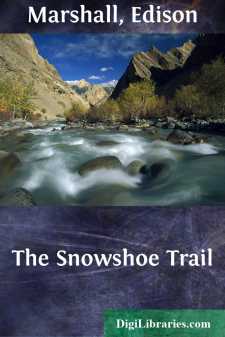Categories
- Antiques & Collectibles 13
- Architecture 36
- Art 48
- Bibles 22
- Biography & Autobiography 813
- Body, Mind & Spirit 142
- Business & Economics 28
- Children's Books 17
- Children's Fiction 14
- Computers 4
- Cooking 94
- Crafts & Hobbies 4
- Drama 346
- Education 46
- Family & Relationships 57
- Fiction 11829
- Games 19
- Gardening 17
- Health & Fitness 34
- History 1377
- House & Home 1
- Humor 147
- Juvenile Fiction 1873
- Juvenile Nonfiction 202
- Language Arts & Disciplines 88
- Law 16
- Literary Collections 686
- Literary Criticism 179
- Mathematics 13
- Medical 41
- Music 40
- Nature 179
- Non-Classifiable 1768
- Performing Arts 7
- Periodicals 1453
- Philosophy 64
- Photography 2
- Poetry 896
- Political Science 203
- Psychology 42
- Reference 154
- Religion 513
- Science 126
- Self-Help 84
- Social Science 81
- Sports & Recreation 34
- Study Aids 3
- Technology & Engineering 59
- Transportation 23
- Travel 463
- True Crime 29
The Snowshoe Trail
by: Edison Marshall
Categories:
Description:
Excerpt
It was not the first time that people of the forest had paused on the hill at twilight to look down on Bradleyburg. The sight always seemed to intrigue and mystify the wild folk,—the shadowed street, the spire of the moldering church ghostly in the half-light, the long row of unpainted shacks, and the dim, pale gleam of an occasional lighted window. The old bull moose, in rutting days, was wont to pause and call, listen an instant for such answer as the twilight city might give him, then push on through the spruce forests; and often the coyotes gathered in a ring and wailed out their cries over the rooftops. More than once the wolf pack had halted here for a fleeting instant; but they were never people to linger in the vicinity of men.
But to-night it was not one of these four-footed wild folk—this tall form—that emerged from the dark fringe of the spruce forest to gaze down at the town. But he was none the less of the forest. Its mark was upon him; in the silence of his tread, the sinuous strength of his motions; perhaps it lay even in a certain dimness and obscurity of outline, framed by the thickets as he was, that was particularly characteristic of the wild denizens of the woods. But even in the heavy shadows his identity was clear at once. He was simply a woodsman,—and he held his horse by the bridle rein.
The long file of pack horses behind him halted, waiting for their master to go on. He stood musing, held by the darkened scene below him. Hard to read, in the deepening shadows, was the expression on his bronzed face. It revealed relief, of course, simple and heartfelt joy at the sight of his destination. Men do not wander over the blazed trails of the North Woods and not feel relief at the journey's end. There was a hint of fatigue in his posture, the horses' heads were low; and the shacks below meant food and rest. But there was also a pensiveness, a dreamy quietude in his dark eyes that revealed the greater sweep of his thoughts.
He had looked down on Bradleyburg on many previous occasions, but the scene had never impressed him in quite this way before. Already the shadows had crept out from the dark forests that enclosed the little city and had enfolded it in gloom: the buildings were obscured and the street was lost, and there was little left to tell that here was the abode of men. A dim light, faint as the glowing eyes of the wild creatures in the darkness, burned here and there from the window of a house: except for this the wilderness would have seemed unbroken.
"It's getting you down," the man muttered. "It's closing you in and smothering you—just as it has me."
Perhaps, had his words carried far enough in the silence, the townspeople in the houses below wouldn't have understood. His horses, sniffing at his knees, did not seem to hear. But the woodsman could not have made himself any clearer. Words never come easy to those that dwell in the silences of the North. To him it seemed that the twilight was symbolic of the wilderness,—stealing forth with slow encroachments until all of the little town was enfolded within itself. It was a twilight city, the little cluster of frame shacks below him. It could be brave and gay enough in the daylight, a few children could play in its streets and women could call from door to door, but the falling darkness revealed it as it was,—simply a fragment that the dark forests were about to claim. The day was done in Bradleyburg; as in the case of many of the gold camps of the North the wilderness was about to take back its own.
It had had a glorious past, this little city lost in the northern reaches of the Selkirks. In the man's own boyhood it had been one of the flourishing gold camps of the North; and miners had come from all over the continent to wash the gravel of its streams....




